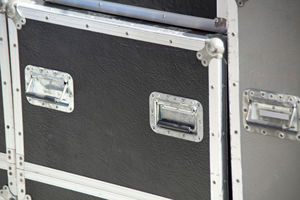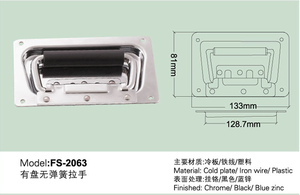
All categories
Featured selections
Trade Assurance
Buyer Central
Help Center
Get the app
Become a supplier

(272 products available)



















































Rifle cases are designed to keep guns and gear safe when travelling or storing. A large variety of cases is available, each intended for different protection, accessibility, and style needs. Those choices range from hard to soft cases and few of them.
Hard cases
This kind of rifle case is made of a rigid material, mostly polymer or metal, and is meant for the utmost protection. Hard cases are known for their strong armor against moisture, elements, and shocks, as well as fortifying the firearm against impact during transport. Certain hard cases rifle” aimed at military use or professional shooters come equipped with foam inlays tailored to the gun's contours, providing a snug fit and additional cushioning. Others are easy to carry because of the wheels and extendable handles.
Soft Cases
Soft cases are less cumbersome, possessing moderate protection for the gun enclosed. Usually knitted from nylon or canvas, soft cases, such as gun bags frequently used because of their lightweight nature, can simply be zipped open, and users normally prefer them over hard cases in less tough situations. In addition, most soft cases incorporate interior padding, external pockets for extra gear, and straps allowing slings or back packs for varied carrying options.
Rugged Hard Cases
Rugged hard cases shotgun are a class of hard cases designed for highly intensive conditions, commonly used in combat, law enforcement, or adventure travel. Roadworthy and waterproof, these cases offer outrageous protection against elements and moisture. Most rugged hard cases come with resistant interiors, reinforced locks, and tailored fit for the firearm. Rugged hard cases are made for people who require their equipment to be indestructible.
Custom-fit Cases
Often, custom-fit cases are hard cases designed to fit a specific rifle model as closely as possible. Primarily, these custom cases are made from hard plastic to insulate the firearm from potential damage due to shocks in transit. Commonly, additional features like custom compartments for accessories and foam padding molded per the gun's shape are included. The custom-fit case is for users with extreme precision needs, such as gunsmiths or competitive shooters.
Lockable Cases
Lockable cases are hard or soft cases that have been fitted with lockable hardware for the purpose of gun safety and theft control. These cases protect unauthorized access and are used by owners who store guns regularly or travel with them. Generally, lockable latch cases may meet transportation requirements, while lockable soft cases include lockable zippers for extra protection.
Several factors are necessary when choosing multi tools and a rifle case, such as protection level, material, size, and intended use.
Protection Level
This refers to the amount of protection that a gun case offers to your firearm. Protection comes in two categories: hard cases, which are meant to protect against the elements and offer the most protection; and soft cases, which are meant to protect against minor risks and are more portable.
Size
Always ensure that the case size is compatible with the rifle and any attachments fitted to it. The birth of proper case sizes is due to rifles without modifications needing only standard sizes, while those with scopes and other attachments require extra space, either in length or compartments.
Material
The case material commonly determines the overall weight and durability features. While polymers are lightweight yet exceptionally strong, metal cases are more substantial, sometimes offering superior security. Canvas and nylon soft cases are lightweight but withstand wear and tear.
Interior Features
Foam padding, dividers, or cushioning keep the rifle stationed to prevent movement. For those with a higher demand for protection, pick-and-foam or custom-molded foam is the best option.
Portability
Portability considers the weight of the case and carrying options. Softer cases always arousemore question and answer session than harder ones, which are heavier and more difficult to move around.
Locking and Sealing Features
If travel is a frequent activity, selecting a case that is lockable and weather resistant will do the trick. Rugged hard cases are brought into this kind of situation, as locking mechanisms and sealing against moisture are present.
A rifle case provides firearms with necessary security and protection during transportation or storage. To maximize its intended purposes, one must learn the proper ways of using it and ensure that the case selected meets the protective needs of the rifle.
Transportation
During movement, the rifle must be secured inside the case. Rifles with modifications may require larger rooms or custom interiors. Lockable cases should always be secured. While smooth cases have zippers or latches, hard cases with wheels and handles ease movement around.
Storage
A case keeps dust and moisture from penetrating the firearm during storage. Lockable cases secure unauthorized access. Storing firearms in a cool dry environment prolongs their lifespan.
Installation
Lorem ipsum dolor sit amet, consectetur adipiscing elit. Fusce aliquet ex erat, fermentum congue erat bibendum in. Sed eget orci nec eros semper aliquet. Cras nec justo consequat, tincidunt lacus id, vehicula lorem. Donec bibendum eros sit amet tortor sodales imperdiet. Fusce a augue mollis, cursus feugiat est in, facilisis pharetra nunc. Ut maximus velit et ipsum aliquet, sagittis elementum nunc ullamcorper. Proin egestas erat sit amet odio ultricies, quis gravida nunc venenatis.
Maintenance and repair of a rifle case ensure long-lasting use and protection of the gun slip inside. Different varieties of cases call for different care methods.
Cleaning Soft Cases
Nylon or canvas cases should be examined for damage after each use. Often, dirt and debris can be expelled by turning the case inside out and shaking it. Wet cloth with mild soap can clean tough stains. Machine washing should be avoided as it weakens the fabric.
Cleaning Hard Cases
Cleaning hard cases is easy because the interior is the only part that needs cleaning. Use mild detergent and a damp cloth to clean the exterior. Inspect interior foam for damage. Consider using a disinfectant to eliminate odor.
Checking Seals and Locking Mechanisms
Wear and tear checking of seals and locks is a regular occurrence in hard cases. Look for cracks in the sealing or wear and tear signs on the locking mechanism. Contact the manufacturer for sealing or locking system replacement recommendations.
Repairing Soft Cases
Apart from zippers or stitching, many soft cases are easily patched up. Sew simple ripped fabric or replace the zipper slider/stop if needed. Replace curtains with new ones only when they are completely worn-out.
Repairing Hard Cases
Hard case damage requires professional help most of the time. Minor scratches may be fixed with paint. Generally, manufacturers have certain repair programs that swap damaged pieces.
Storage
Maintaining a rifle case starts with proper storage. Keep soft cases in dry, airy places to avoid mold. Hard cases can be stored anywhere, but internal foam should be kept away from direct heat exposure.
A1: The type of protection required, the size, the portability, and the material used in making the case.
A2: Soft cases be maintained by cleaning them with soapy water, while hard cases clean the exterior and interior with damp cloths.
A3: Protects firearms from damage and secures them from unauthorized access or theft.
A4: Through regular cleaning, limited exposure to direct sunlight, and care of locks and seams.